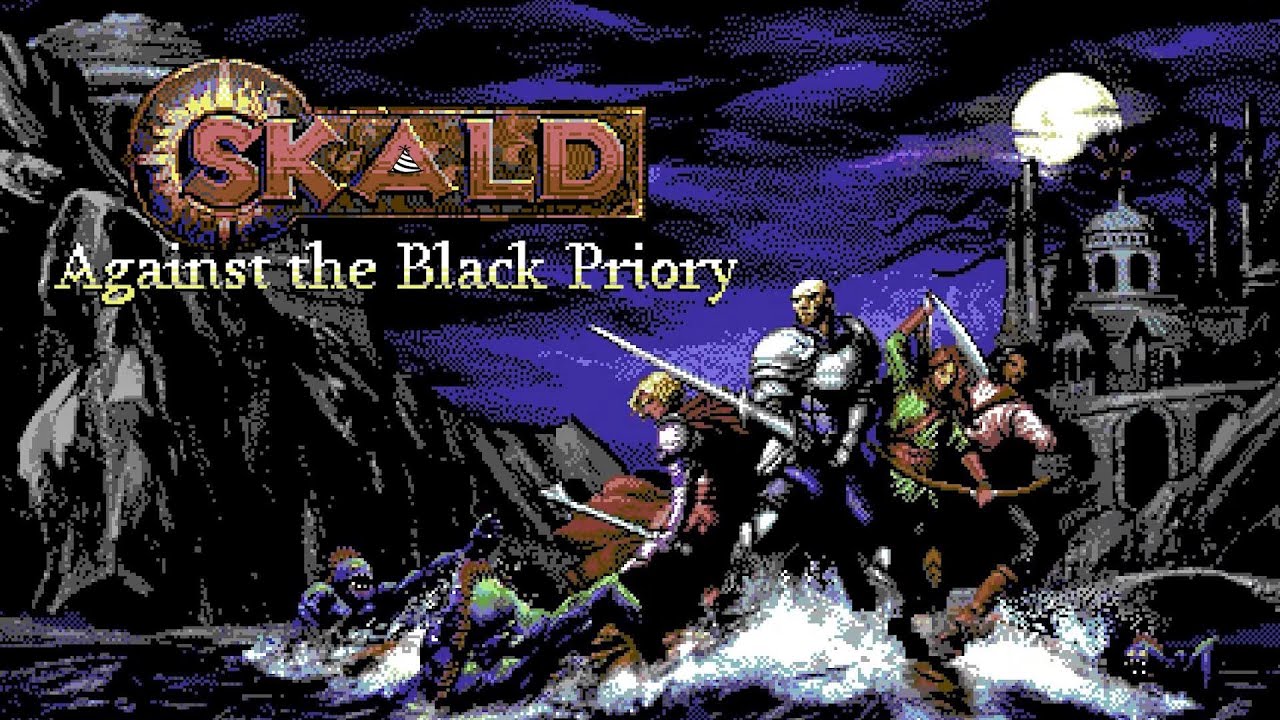Game Title: Skald: Against the Black Priory (base game)
Developer: High North Studios AS
Publisher: Raw Fury
Platform: PC – Available now on GOG and Steam
Release Date: May 30, 2024
“You drag yourself from the black tides, across the corpses of drowned men, and onto the unwelcoming, craggy shoreline. Gulls cry overhead and the stink of seaweed fills your nose. By some miracle you have made it to Idra. It will take all your skill to survive and unravel the eldritch mysteries of the Black Priory.”
What Is It-
Skald: Against the Black Priory is a role-playing game set in a dark Lovecraftian horror-infused fantasy world. Sporting 8-bit style pixelated graphics, turn-based combat, and a deep compelling story, it is reminiscent of the early Ultima games, with a healthy dash of the original Baldur’s Gate thrown in. The soundtrack masterfully encapsulates the era when video games were coming of age—an era when gamers were unjaded and mesmerized by the simplicity of the time.
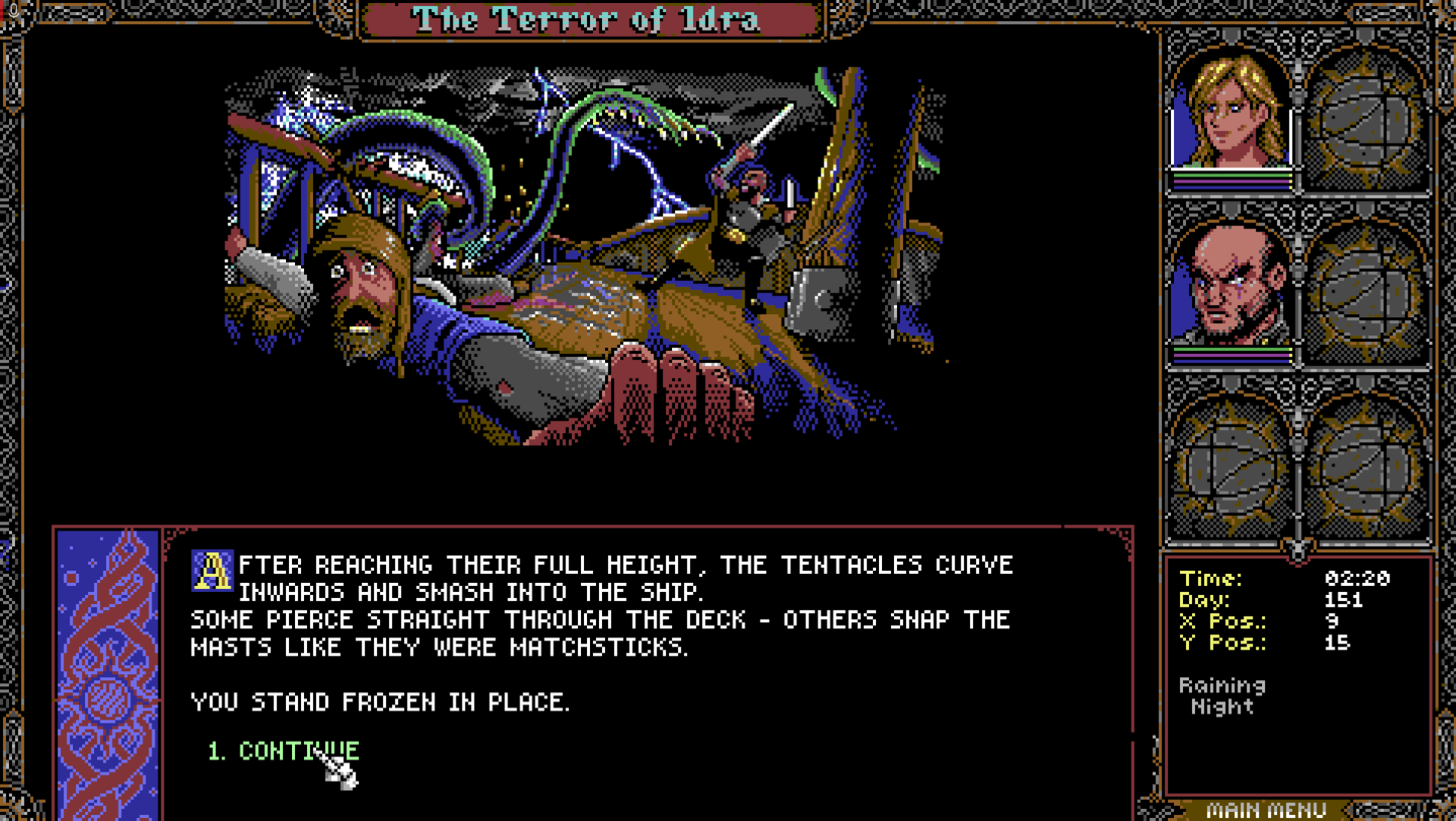
The Good
Story – Caution: Minor Spoilers Ahead
The prologue opens with the protagonist, which is you, being awoken on a ship. Branching dialogue options allow the player some freedom in how you choose to do so. You can jump right up and be joyous that it is a new day, get up but reluctantly, or be hungover and cranky (I see nothing wrong with the latter option). While the choices were limited, there were still choices to be had. I enjoyed the small amount of freedom that the dialogue options provided, rather than being pigeonholed into a completely linear narrative.
After Flamedance (my character’s name) is awake, she must make her way up to the deck, which includes several encounters along the way. If the tutorial is on, the player is guided through all the basics, including combat, stealth, and interacting with objects. Once on deck, not to spoil too much of the story, the inevitable shipwreck occurs. Inevitable because 9/10 times when there is a ship and the player is on it, it is bound to capsize. I believe it is written in the trope rulebook somewhere, found in *The White Ship category. Too soon?
At this point, the player is treated to a brief flashback of how she wound up in this predicament and what inspired her to make this ill-fated journey. Another common trope ensues in which a daughter is missing and a father needs the help of me, the one and only protagonist, to find her. And of course, there is always a history between the asker and the asked. This is not to say it is bad, although it is very familiar and left me wondering if the story would play out similarly. Thankfully, there was more at work here than just a run-of-the-mill find-the-missing person quest. Much more. And much more sinister than I expected.
After agreeing to find the missing daughter in the flashback, the player is transported back to the present, on the Island of Idra. A fortunate turn of events, as this is where I was heading to begin my search. The relief is palpable when I realize I have survived the shipwreck, although I am knee-deep in wreckage and murky water. As I struggle my way through, I realize I am not alone. Fortunately, a young woman, named Kat, witnessed the carnage and not only helped me ashore but agreed to join my quest to find the wayward daughter.
Kat has seen and sensed much and is a well of useful information right off the bat. I should be grateful that someone such as her came to my aid before any evil could befall me, aside from the ship being capsized, that is. And I am grateful, yet I am wary and distrustful. For the time being though, we travel on together figuratively hand in hand, felling whatever tries to harm us, of which there is plenty.
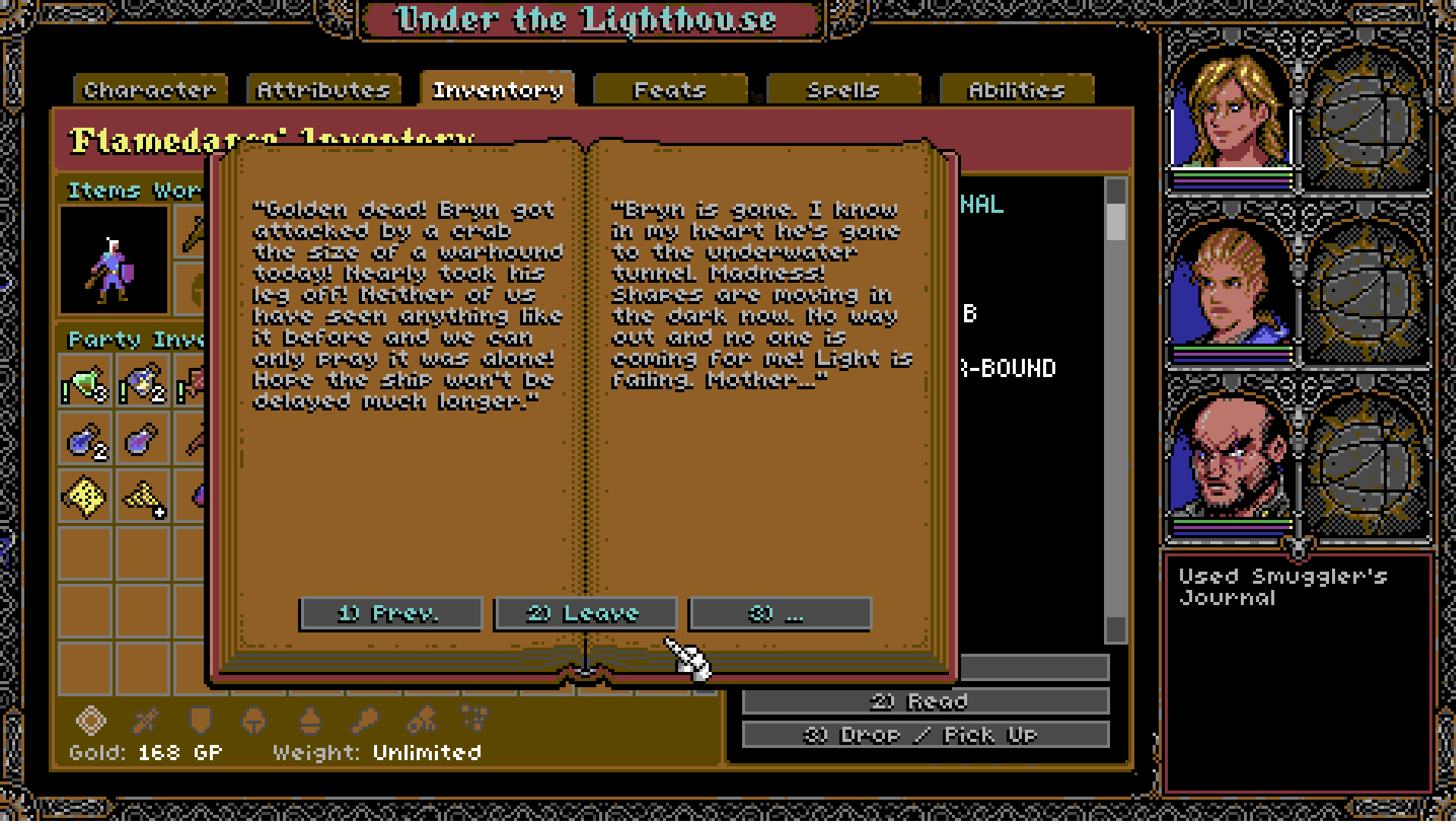
Captivated –
Without going further into details, the dialogue and story were so fleshed out and well-written that I was drawn in immediately, which I was not expecting. What I expected was a middling endeavor that employed pixelated graphics and chiptune audio that would elicit nostalgia in those of us who started our gaming journey in the 1980s. What I found, however, was a rich and well-told narrative that hooked me from the beginning and continued to lead me by the reins the further I progressed. The more I discovered the more I wanted to discover. It took all my willpower to get back on that boat (meaning turning off the game and walking away) and go back to whence I came. Thankfully, there was no boat to go back to so what choice did I have but to keep on searching for Embla?
Settings –
Skald boasts numerous settings that can be changed, with some of the options exceeding the norm. Not only can the sound and keybinds be adjusted, but the player is free to customize difficulty, which can be tailored to the experience and style of the individual playing the game. A d20 system dictates combat and skill checks and the player has the freedom to fine-tune how rolls play out.
There is an option that offers to what degree tutorials are shown, which include none, some, or extensive. I chose extensive to learn as much as I could about the gameplay and I was not disappointed. Though I am a gamer from the time of dinosaurs and am well versed in this type of RPG, I still appreciate a bit of hand-holding from time to time and was pleased with how well Skald handled it.
For those who need a little help along the way, hitting tab will pull up console commands, hitting shift will highlight objects that can be interacted with, and for those of you who, like me, are constantly hitting F5 to quick save, you are in luck as it has been implemented.
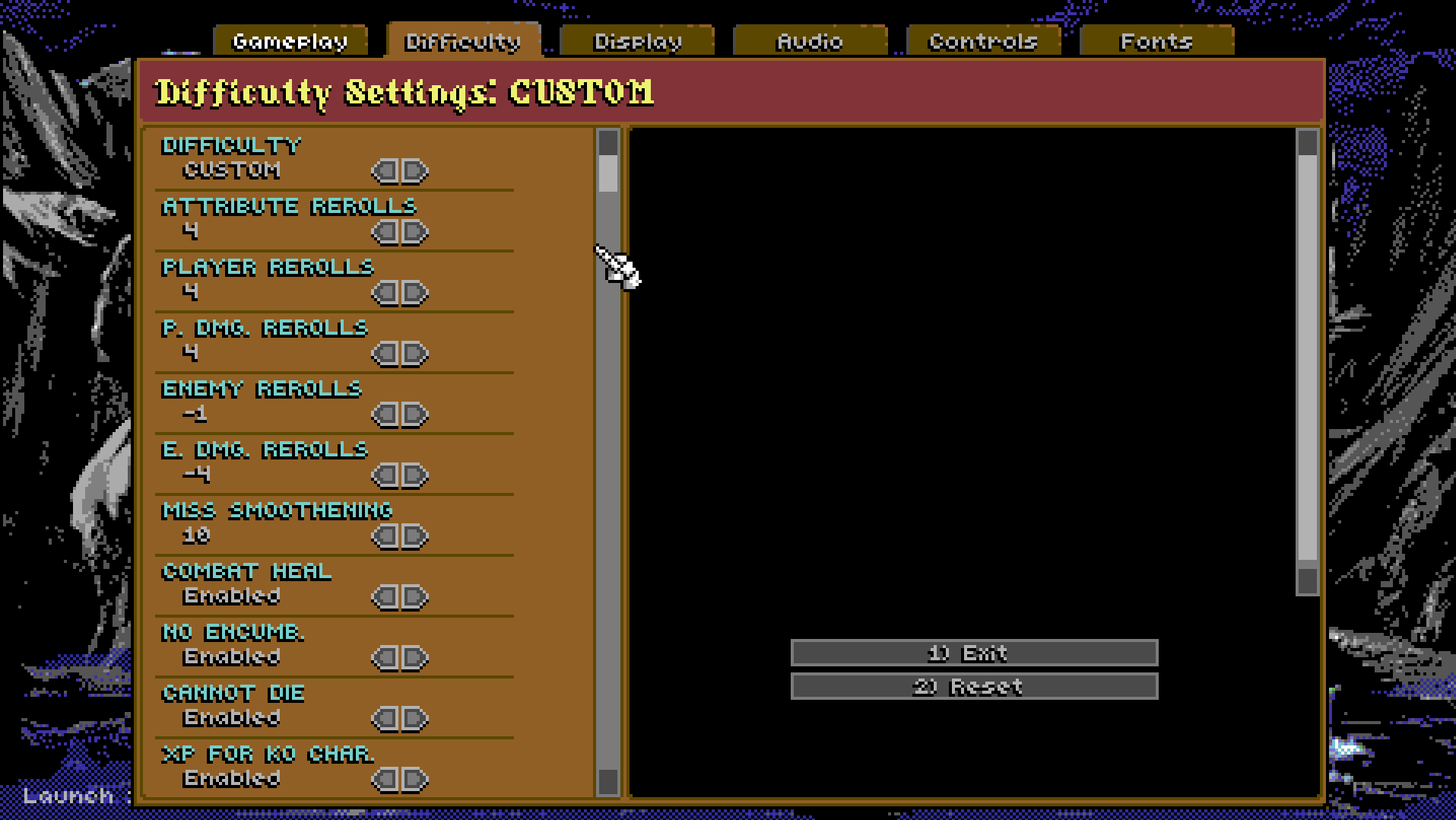
Visuals –
Skald’s dark pixelated graphics elicit a sense of dread and disorientation, which is done very well. Creepy is an understatement. While I loved the visuals, which filled me with memories of the past, they are very old school and may not appeal to all. I have seen many gamers snub an outstanding game because the graphics were not state-of-the-art. It would be a shame to miss out on a gem like this because the game looks “dated.”
Not All Is Well
Movement/Combat -
As well done as I found the narrative, I found movements in and out of combat to be somewhat janky. This is not a deal breaker, although it did pull me out of the narrative when my character would get hung up on the terrain due to obstacles blending too well. Rather like me trying to walk on any given day.
In regards to combat, there is a tactical grid that can be enabled. I found it to be intrusive and disabling it does not remove it completely. This is unfortunate because it somewhat obscures enemies when trying to target them.
Another issue with combat is magic. Spells rarely hit an enemy. Magic users became ineffectual on the battlefield. Attacks succeed or fail depending on a roll of the dice. Rolls seemed to be biased against spells. So much so that my character, who was a cleric, resorted to bashing enemies with a club rather than wasting time casting an offensive spell.
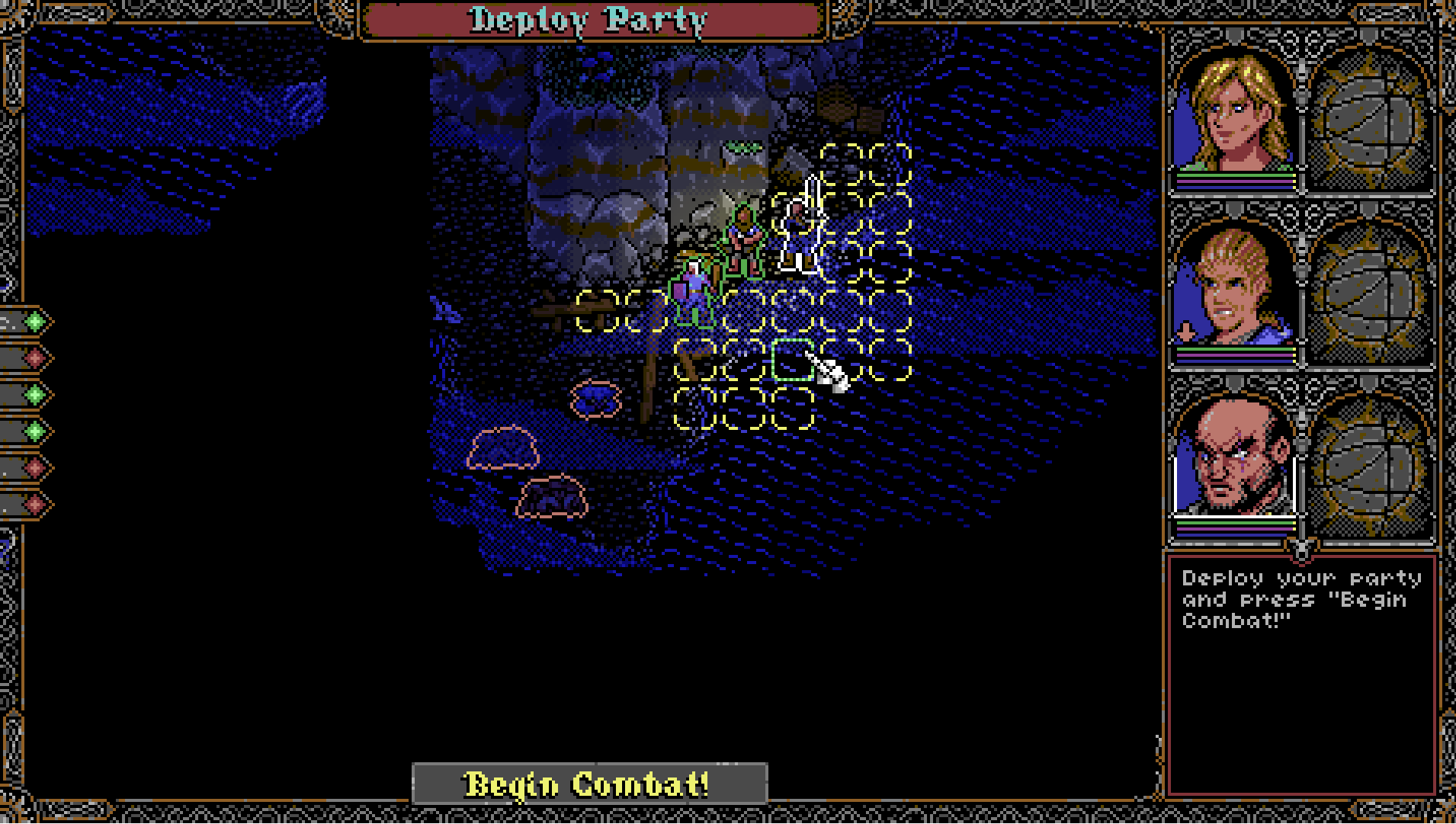
Map –
There is no auto-map that the player can access. There is not even a mini-map. While the game harkens back to the days when maps were not always included, I tend to feel lost without one. However, this oversight may be intentional and essential to elicit a sense of confusion and paranoia within the player to mimic what the characters are feeling.
Minor Annoyances –
There is much to love about Skald but it is not without its share of minor issues. One of those vexations has to do with the fog of war effect. After completely uncovering an area it will sometimes return after moving on then and returning. There were a couple of instances where I was sure I had uncovered the entire area, only to find it completely covered again. Could this be part of the game design to keep the player in a state of confusion? I would not bet against it. If so, well played Raw Fury, well played.
There are occasions after completing a quest and returning to the quest giver, that the dialogue options had not changed. I could still ask what the task was I needed to complete while having already completed the quest. Leaving the area and returning did not rectify the issue and the quest remained in my journal as incomplete.
Conclusion
The Devil is in the Details –
Skald: Against the Black, Priory is not perfect, nor is it groundbreaking. What the developers have created is a well-fleshed-out old-school RPG without the bells and whistles of modern games. The narrative is compelling and well-written. Though wordy, it is never circumlocutory. Each conversation and description uncovers more than just the mystery of a missing daughter. With each discovery comes a new psychological torture. Considering the old-school graphics, one might think this was an exaggeration. Words can be very powerful. Very powerful indeed and can leave the player flabbergasted, to say the least.
What High North Studios AS has done with prose is to create a detailed and intricate world. One that is filled with darkness and horror. One that I cannot stop going back to. It calls to me…like the sea. Excuse me; I have a boat to catch. What could possibly go wrong?
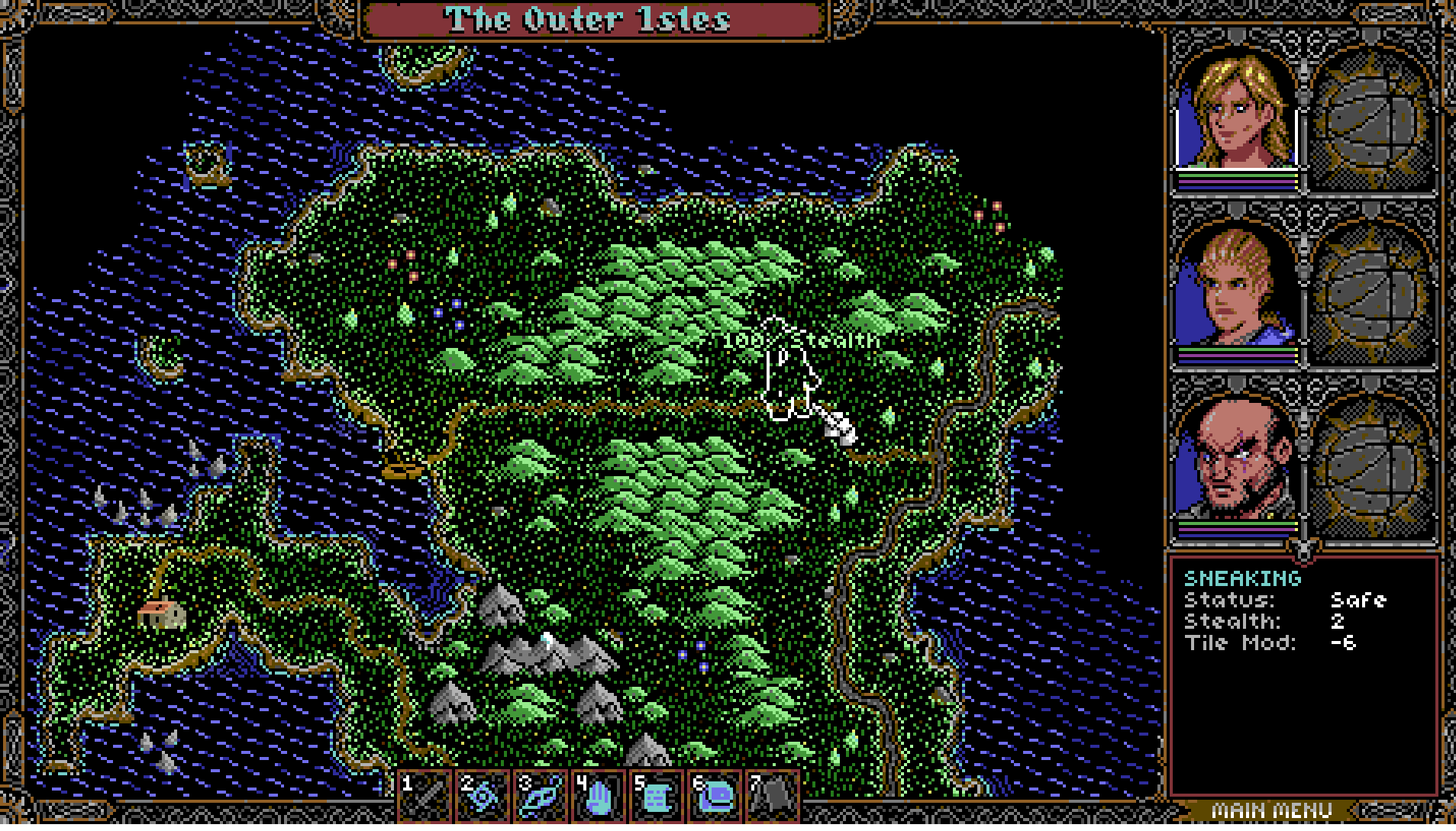
YAY OR NAY
Skald: Against the Black Priory is a big Yay for me. While it struggles with clunky movements and unsatisfying combat, the narrative more than makes up for it. If you are looking for something to satisfy your mind more than your trigger finger and enjoy a bit of nostalgia, this is the game you are looking for (maybe). I give it a solid B+.
*The White Ship tragedy occurred in the early 12th century and is an important part of history and pop culture. “House of the Dragon” is based on the events that occurred after the ship capsized. I won’t spoil it, as it only happened 904 years ago, but information is just a search away.


